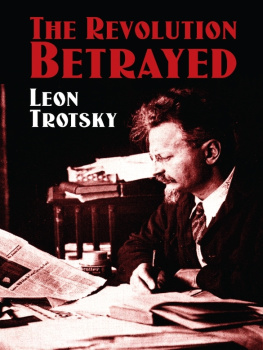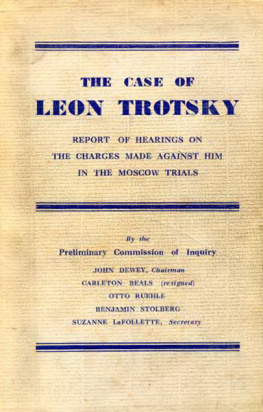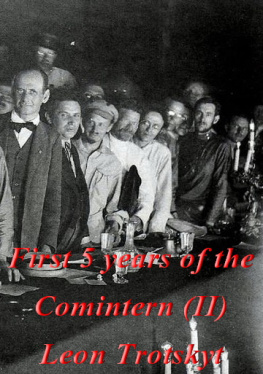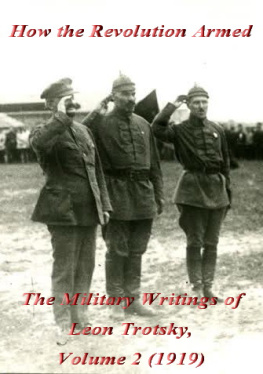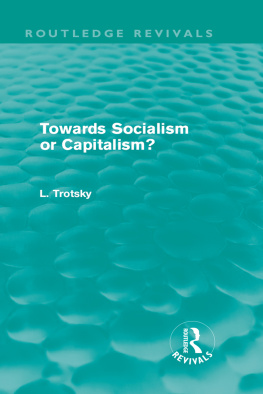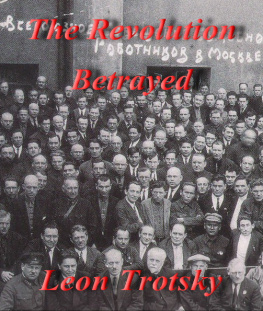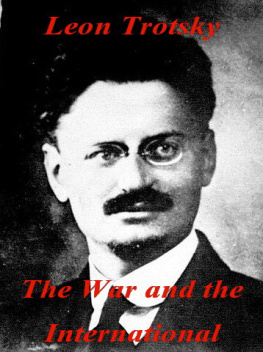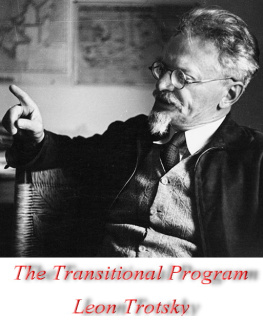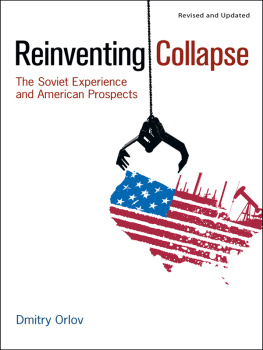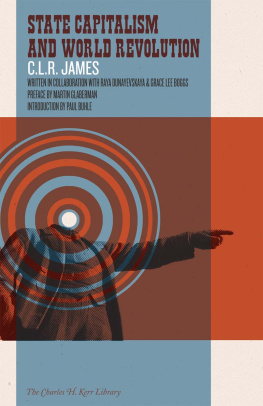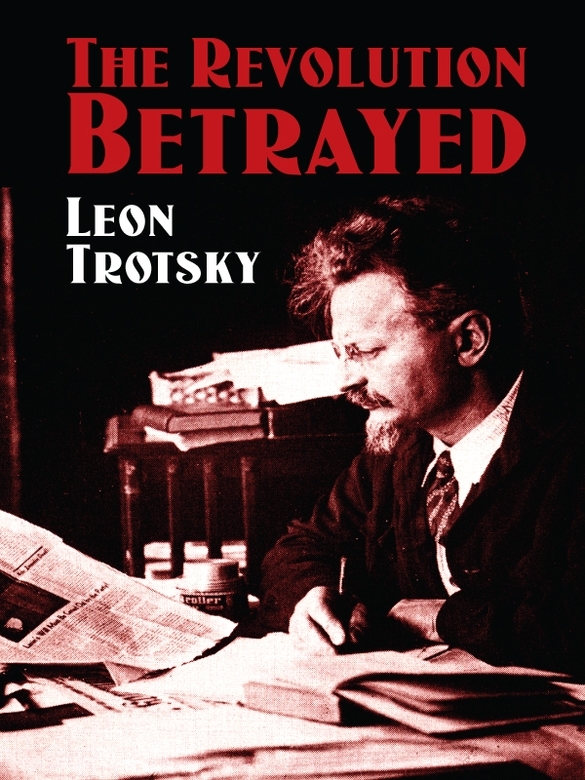APPENDIX
SOCIALISM IN ONE COUNTRY
T HE reactionary tendencies of autarchy are a defense reflex of senile capitalism to the task with which history confronts it, that of freeing its economy from the fetters of private property and the national state, and organizing it in a planned manner throughout the earth.
In Lenins Declaration of the Rights of the Toiling and Exploited Peoplepresented by the Soviet of Peoples Commissars for the approval of the Constituent Assembly during its brief hours of lifethe fundamental task of the new regime was thus defined: The establishment of a socialist organization of society and the victory of socialism in all countries. The international character of the revolution was thus written into the basic document of the new regime. No one at that time would have dared present the problem otherwise! In April 1924, three months after the death of Lenin, Stalin wrote, in his brochure of compilations called The Foundations of Leninism: For the overthrow of the bourgeoisie, the efforts of one country are enoughto this the history of our own revolution testifies. For the final victory of socialism, for the organization of socialist production, the efforts of one country, especially a peasant country like ours, are not enoughfor this we must have the efforts of the proletarians of several advanced countries. These lines need no comment. The edition in which they were printed, however, has been withdrawn from circulation.
The large-scale defeats of the European proletariat, and the first very modest economic successes of the Soviet Union, suggested to Stalin, in the autumn of 1924, the idea that the historic mission of the Soviet bureaucracy was to build socialism in a single country. Around this question there developed a discussion which to many superficial minds seemed academic or scholastic, but which in reality reflected the incipient degeneration of the Third International and prepared the way for the Fourth.
Petrov, the former communist, now a White migr, whom we have already quoted, tells from his own memories how fiercely the younger generation of administrators opposed the doctrine of the dependence of the Soviet Union upon the international revolution. How is it possible that we in our own country cannot contrive to build a happy life? If Marx has it otherwise, that means that we are no Marxists, we are Russian Bolsheviksthats what! To these recollections of disputes in the middle of the twenties, Petrov adds: Today I cannot but think that the theory of building socialism in one country was not a mere Stalinist invention. Completely true! It expressed unmistakably the mood of the bureaucracy. When speaking of the victory of socialism, they meant their own victory.
In justifying his break with the Marxist tradition of internationalism, Stalin was incautious enough to remark that Marx and Engels were not unacquainted with the law of uneven development of capitalism supposedly discovered by Lenin. In a catalogue of intellectual curiosities, that remark ought really to occupy a foremost place. Unevenness of development permeates the whole history of mankind, and especially the history of capitalism. A young Russian historian and economist, Solnzev, a man of exceptional gifts and moral qualities tortured to death in the prisons of the Soviet bureaucracy for membership in the Left Opposition, offered in 1926 a superlative theoretical study of the law of uneven development in Marx. It could not, of course, be printed in the Soviet Union. Also under the ban, although for reasons of an opposite nature, is the work of the long dead and forgotten German Social-Democrat, Vollmar, who as early as 1878 developed the perspective of an isolated socialist statenot for Russia, but for Germanycontaining references to this law of uneven development which is supposed to have been unknown until Lenin.
Socialism unconditionally assumes economically developed relations, wrote Georg Vollmar, and if the question were limited to them alone, socialism ought to be strongest where the economic development is highest. But the thing does not stand that way at all. England is undoubtedly the most developed country economically, yet we see that socialism plays there a very secondary role, while in economically less developed Germany socialism has already such power that the entire old society no longer feels stable. Referring to the multitude of historic factors which determine the course of events, Vollmar continued: It is clear that with an interrelation of such innumerable forces the development of any general human movement could not, and cannot, be identical in the matter of time and form even in two countries, to say nothing of all.... Socialism obeys the same law.... The assumption of a simultaneous victory of socialism in all cultured countries is absolutely ruled out, as is also, and for the same reasons, the assumption that all the rest of the civilized states will immediately and inevitably imitate the example of a socialistically organized state.... ThusVollmar concludeswe arrive at the isolated socialist state, concerning which I trust I have proven that it is, although not the only possibility, nevertheless the greatest possibility. In this work, written when Lenin was eight years old, the law of uneven development receives a far more correct interpretation than that to be found among the Soviet epigones, beginning with the autumn of 1924. We must remark, incidentally, that in this part of his investigation Vollmar, a very second-rate theoretician, is only paraphrasing the thoughts of Engelsto whom, we are told, the law of unevenness of capitalist development remained unknown.
The isolated socialist state has long ceased to be a hypothesis, and become a factin Russia to be sure, not in Germany. But this very fact of isolation is also a precise expression of the relative strength of world capitalism, the relative weakness of socialism. From an isolated socialist state to a socialist society once for all done with the state remains a long historic road, and this road exactly coincides with the road of international revolution.
Beatrice and Sidney Webb on their part assure us that Marx and Engels did not believe in the possibility of building an isolated socialist society only because neither of them had ever dreamt of such a powerful weapon as the monopoly of foreign trade. One can hardly read these lines from the aged authors without embarrassment. The taking over by the state of commercial banks and companies, railroads, mercantile marine, is as necessary a measure of the socialist revolution as the nationalization of the means of production, including the means employed in the export branches of industry. The monopoly of foreign trade is nothing but a concentration in the hands of the state of the material instruments of export and import. To say that Marx and Engels never dreamt of the monopoly of foreign trade is to say that they never dreamt of the socialist revolution. To complete the picture, we may note that in the work of the above-quoted Vollmar, the monopoly of foreign trade is presented, quite correctly, as one of the most important instruments of the isolated socialist state. Marx and Engels must then have learned about this secret from Vollmar, had he himself not learned it earlier from them.
The theory of socialism in one countrya theory never expounded, by the way, or given any foundation, by Stalin himselfcomes down to the sufficiently sterile and unhistoric notion that, thanks to the natural riches of the country, a socialist society can be built within the geographic confines of the Soviet Union. With the same success you might affirm that socialism could triumph if the population of the earth were a twelfth of what it is. In reality, however, the purpose of this new theory was to introduce into the social consciousness a far more concrete system of ideas, namely: the revolution is wholly completed; social contradictions will steadily soften; the kulak will gradually grow into socialism; the development as a whole, regardless of events in the external world, will preserve a peaceful and planned character. Bukharin, in attempting to give some foundation to the theory, declared it unshakably proven that we shall not perish owing to class differences within our country and our technical backwardness, that we can build socialism even on this pauper technical basis, that this growth of socialism will be many times slower, that we will crawl with a tortoise tempo, and that nevertheless we are building this socialism, and we will build it. We remark the formula: Build socialism even on a pauper technical basis, and we recall once more the genial intuition of the young Marx: with a low technical basis only want will be generalized, and with want the struggle for necessities begins again, and all the old crap must revive.

